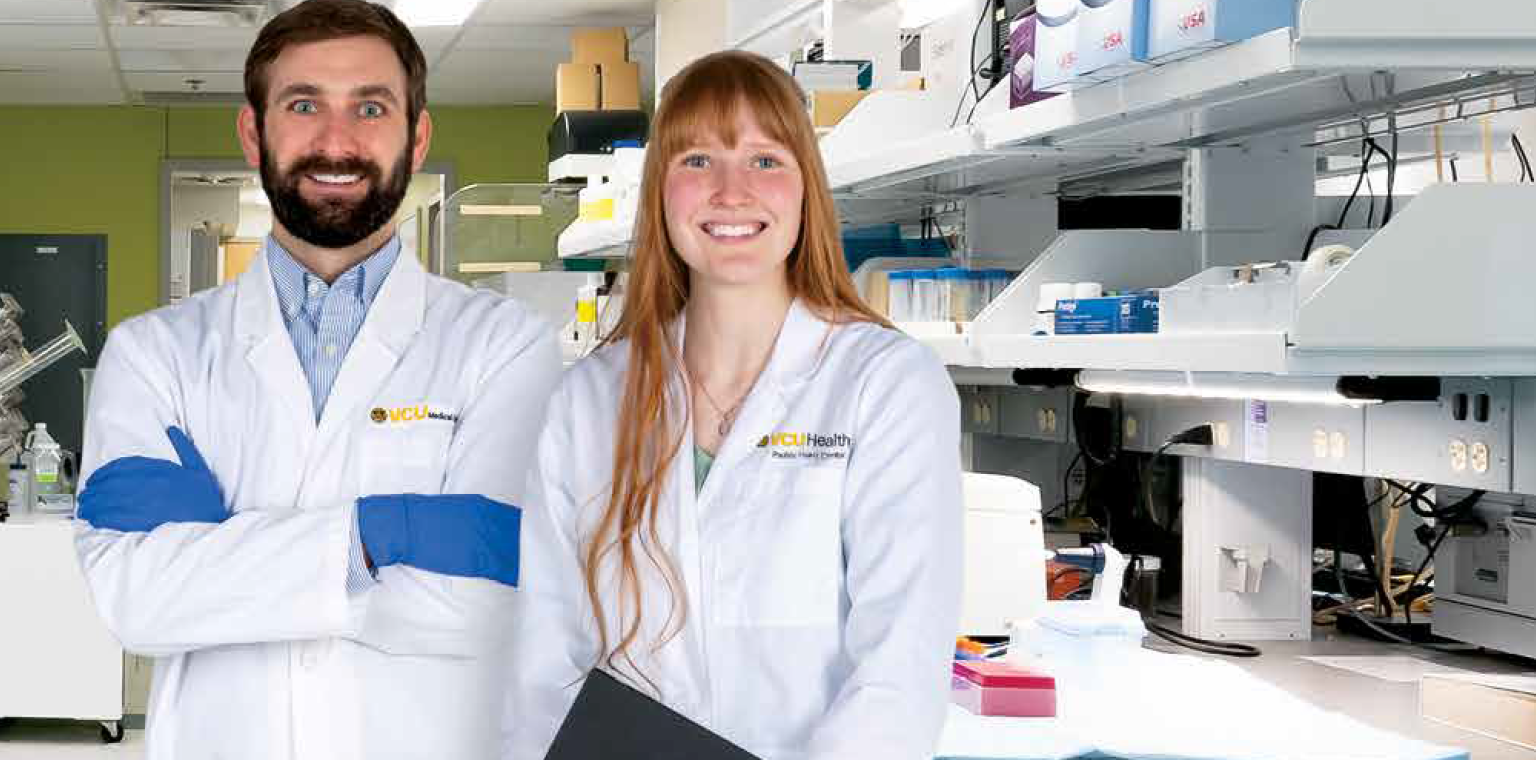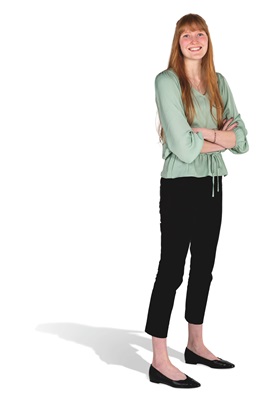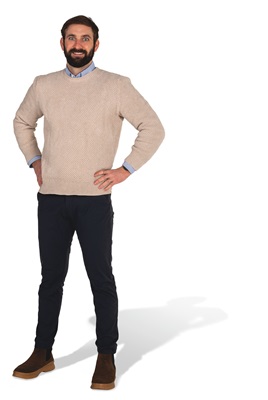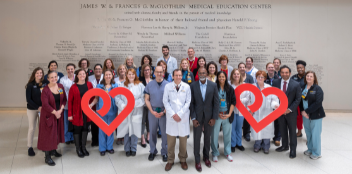Tomorrow's investigators
A new T32 training program in partnership with the National Institutes of Health allows early-stage investigators to learn the techniques used to perform and advance multidisciplinary translational cardiovascular research.

A new training program in partnership with the National Institutes of Health allows early-stage investigators to learn the techniques used to perform and advance multidisciplinary translational cardiovascular research. The Multidisciplinary Training Program in Translational Research (T32) in the Division of Cardiology at VCU Health is designed for postdoctoral physician-scientists and Ph.Ds.
“The T32 is an exciting and important expansion of cardiovascular training at VCU Health Pauley Heart Center,” said Dr. Greg Hundley, Pauley director. “We see this program as part of our mission in the pursuit of excellence in research, education and clinical science,” said Dr. Kenneth Ellenbogen, chair of the Department of Cardiology, noting that the T32 supports Pauley’s strategic plan.
Paired with established investigators throughout VCU’s schools and specialty health centers, T32 fellows participate in translational cardiovascular science projects for the purpose of applying this knowledge to design and lead future studies directed toward the diagnosis, treatment and prevention of cardiovascular disease. Fellows do clinical rotations at VCU Medical Center and Richmond VA Medical Center.
The T32 expands Pauley’s fellowship slots for M.D.s from six to seven per year and adds a year to the existing three-year program to accommodate research activities. Trainees in this program will have 2.25 years of clinical training, making them eligible for the ACMGE board certification exam. The remainder of their four-year curriculum will be dedicated to research.
The program is funded by a highly competitive $1.5 million NIH grant. “The federal government recognized the strengths of cardiovascular disease research at VCU Health, and our cardiovascular medicine and surgery as a training ground for the next generation of scientists,” Hundley said.
Private philanthropy has helped create an environment for research at Pauley. “The government recognizes we have more than just good science investigators — we also have the right resources available. We’re very appreciative to our institution as well as our philanthropic donors for providing us with the equipment and space to make this program possible,” Hundley noted.
The T32 recognizes Pauley as a place where investigators thrive, and their careers are supported. “We are creating an environment for the fellows to move along in their careers and help us perform research on combating all the adverse morbidity and mortality associated with cardiovascular disease,” Hundley said. “It’s creating the next generation of Kenneth Ellenbogens and Antonio Abbates and Fadi Salloums.”
The ideal T32 candidate is proactive in their education, committed to excellence and prepared to take advantage of the outstanding opportunities VCU Health offers, said Dr. Gautham Kalahasty, program director, who, with Hundley and Ellenbogen, shares responsibility for the management of the fellowship program and for the successful completion of appropriate training for each fellow.
Join us!
Applicants from diverse racial and gender backgrounds, and those with disabilities, are being recruited into the program. Learn more about the T32 fellowship
Meet the inaugural T32 fellows
 Emily Heiston, M.Ed., Ph.D.
Emily Heiston, M.Ed., Ph.D.
What attracted you to the Division of Cardiology’s T32 program?
I was looking for a postdoc where I could become a more independent investigator while broadening my skills.
The T32 fellowship is very attractive because it’s all-around training, and you are the focus. My background is in metabolism, and in reading about the program and the investigators at Pauley, I noticed that something that wasn’t being discussed as much was the metabolic piece. Because of that, I thought I would be a great addition. Not only would I be able to help the investigators with their research, but the program would help me learn new skills about different disease states while working with a clinical population.
What have you been doing since starting your fellowship last August?
I am getting another master’s degree in clinical and translational sciences, and that is a huge perk of the program. Because of COVID-19, I haven’t been able to do clinical hands-on research, but I’ve been able to submit proposals for papers I hope to write.
What do you envision for the rest of the year?
By the fall, I hope to start working with patients and collecting clinical data. Then, moving forward, I’ll submit grants based on pilot data. By the end of my program, my goal is to submit a K99/R00 grant so that I can become an independent researcher.
Describe your research interests.
I’m really interested in understanding the metabolic health of the adipose tissue that we carry. There’s a large multisite trial study going on right now, called UPBEAT, for women who have breast cancer and are undergoing anthracycline-based chemotherapy. I’m proposing getting and analyzing data from the study, for things like body composition and blood work. There’s another project ongoing at Pauley, called PREVENT, where they’re combining chemotherapy with a statin (the medication for cholesterol), which has been shown previously through clinical trials to impact adipose health and overall metabolic health. I’m interested in getting a better profile of these breast cancer patients at baseline and after treatment, and then into survivorship, to see how metabolic profiles are altered with or without a drug. Since my background and passion is in exercise physiology, I would like to then submit a grant asking: What if we combine these treatments with exercise?
What do you feel will be your impact on patient care?
I want to make a difference in patient care. My research will give us some data and ultimately help clinicians be as armed as possible, so that people who are undergoing these breast cancer therapies are getting the most precision-based medicine for the best prognosis.
What advice or message do you have for future T32 fellowship applicants?
If you are interested and feel you can either add or learn something new, don’t be afraid to apply. Each person I meet makes me more energized and excited to be here. I feel like I’m being prepared and will be in the best spot possible for not only my career, but science in general. I’m confident that by the end, I’m going to be exactly where I’m supposed to be and make waves.
George Wohlford IV, Pharm.D.
What attracted you to the Division of Cardiology’s T32 program?
Ten years from now, I see myself in academia mentoring a postdoc fellow and executing a grant. What better way to achieve this goal than via the T32? It is allowing me to develop the skills necessary to independently lead a research group.
What have you been doing since you started last August?
Coming from a more clinical research background moving toward bench research, there has been a knowledge gap I have been working to fill. One of the first things asked of me was to interview faculty who supported the T32 application. Then from that, identify a mentoring team. More recently, I am learning to do the basics in the wet lab. For example, just before this interview I was working on a lipid extraction for some samples we plan to process later this week. Other time has been spent following up with prior research projects and getting those manuscripts published. Also, I have been taking a data science course, learning to use software for analyzing the types of data we plan to generate.
Describe your research interests.
Inflammation clearly plays a pathophysiologic role in cardiovascular disease. I think that, historically speaking, inflammation has been viewed as a marker and not really a driver of cardiovascular disease. [Working with faculty mentors], we’re trying to understand if there are lipid mediators in the blood, mediators
of inflammation, that we can measure with a simple blood draw that may help us tailor current and future therapies to individual patients and maybe even identify targets for novel therapies. This goal falls in line with a larger NIH goal of precision medicine.
What do you envision for the rest of the year?
There’s an ongoing clinical trial, REDHART2, that Dr. Abbate’s and Dr. Van Tassell’s team are doing, and they have very generously offered samples collected at the baseline prior to treatment. We’re looking at those baseline samples using new high-throughput technologies to see if we can identify markers that predict who is going to improve, or who has improvement in prognostic surrogate markers, within the confines of the clinical trial. Also, I will continue classes to learn how to analyze the data generated. That’s the skill set I’m going to continue to grow.
What impact will your work have on patient care?
It comes back to precision medicine. Say we find a biomarker that can tell us one patient is going to respond well to a certain treatment and then a different patient
is not going to respond well to the treatment. Maybe we only target those patients that are expected to respond well to the treatment. Maybe there’s a panel of lipids that we could look for, and we can say, based on the patient’s panel results, here is the treatment regimen that they are most likely to respond favorably to. That is the more distant future goal of how this research might be implemented into practice.
What advice or message do you have for future T32 fellowship applicants?
Everyone on this T32 grant has asked: “How can I help you?” Everyone here wants you to succeed.
Back to Spring-2021


